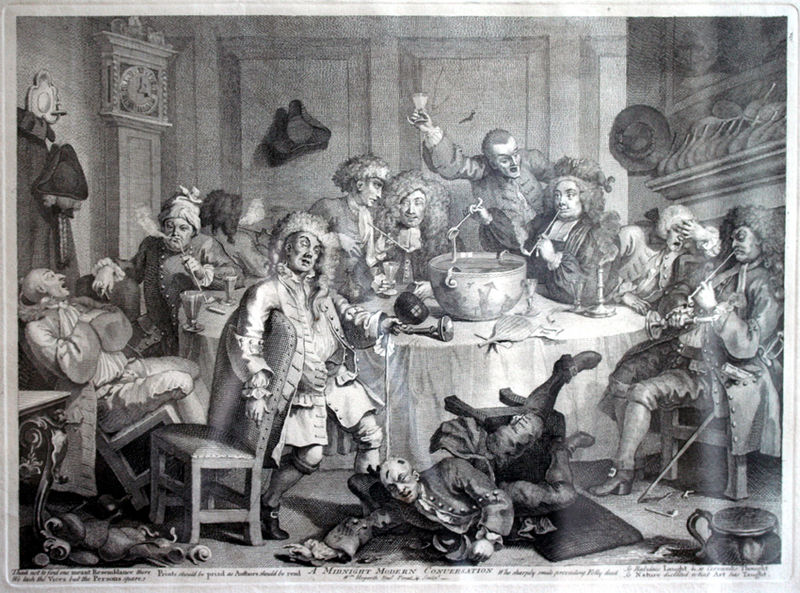If an alien came down tomorrow and read Decanter magazine, he or she (or perhaps some new completely unthought of sex from the Alpha Centauri), would never guess that the subject being written about was not only meant to be fun but was in fact an intoxicant. I’m not singling out Decanter for special criticism, almost all wine writing no matter how vivid and evocative is written from the point of view of absolute sobriety. I can think of no other activity where the literature on the subject is so far removed from most people’s everyday experiences.
We enjoy wine because it is alcoholic. None of the culture built up around wine would exist if it weren’t intoxicating. As much as we might like to think that wine tastings are in the words of Dr Frasier Crane “just about wine and clear constitutional procedures for enjoying it”, we should be honest that the reason most people attend them is at least partly to get drunk. How drunk though depends on the crowd. Before Christmas I put on what was grandly billed a “port masterclass” at a shop in Brockley. The audience consisted largely of grandparents of my daughter’s friends. Most had polished off a bottle (not of port I hasten to add) before I attempted to talk them through the ports. Needless to say there were no spittoons; teenagers on a school trip would have been an easier audience to control.
Artist’s impression of last year’s Brockley wine tasting
Michael Broadbent certainly wouldn’t have approved. He wrote that “it is nothing short of ridiculous to drink one’s way through a tasting.” Of course there’s a good reason why pros don’t taste like south London winos. I don’t want the buying team at the Berry Bros half cut when assessing the new Burgundy vintage.
There is, however, a happy medium between Brockley Bacchanalia and the asceticism of the professionals. A wine tasting when done properly works like an ancient Greek symposium in that you have a formalised way of talking, in this case about wine, and you all drink at the same rate. Overt drunkenness is frowned upon but so is total sobriety. A degree of intoxication helps British people to shake off their self-consciousness and talk freely about wine. Wine talk doesn’t seem so pretentious when you’ve had a few in like-minded company. If you taste sober you miss the true joy of wine appreciation which is the interplay between wine’s intellectual and visceral side
Recently I had been forgetting this important fact. ‘Tasting wine with you isn’t fun anymore’ my wife told me. At wine events which were meant to be social, I spent my time frantically scribbling notes, spitting, trying to get round quickly and getting impatient with lingerers. I was tasting like a pro when I should have been drinking like an amateur.
Interestingly it is only wine that has this gap between how a professional and an amateur function. You can’t properly assess a whisky without gauging how it goes down the throat (or so the experts claim) which is why whisky tasters rarely have more than ten in a flight. It’s the same with beer. I judged a beer competition recently where I tried over a hundred beers and didn’t spit once. Which is perhaps why you rarely meet a thin beer writer. Can it be a coincidence that beer and whisky are seen as fun and unpretentious whereas wine still suffers from accusations of snobbery?
You’d never guess it from attending most professional tastings but people in the wine trade can be quite fun. You can catch a glimpse of this by reading Noble Rot magazine, a small circulation publication which is something of the in house magazine for the wine trade. Alongside suitably reverent features about cult Burgundy producers are pieces written from something of an off-duty perspective ie. no spittoons! In fact the amount of feasting and drinking in its pages would probably give the British Medical Association a collective apoplexy.
But the best writing on wine has often been done by amateurs, Roger Scruton for example, because they don’t have the disconnect between wine appreciation and intoxication. It’s the same with television. The most entertaining programme made about drink in recent years was a Christmas special presented by restaurant critic Giles Coren and comedian Alexander Armstrong. There was not a spittoon in sight. It just goes to show that wine can be fun as long as you remember to swallow occasionally.
A shorter version of this appeared in the Oldie.


“I was tasting like a pro when I should have been drinking like an amateur” — that is a beautiful sentence.